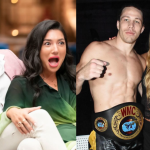
Running a night is risky business. I mean, most people find it hard to promote themselves let alone an event but then again promoters aren’t most people. While us common folk balk at the prospect of losing money, dealing with weird DJ’s or going to bed at 7am, promoters thrive on the pressure of flying in a psychedelic trance act from Brazil and making sure the shit doesn’t hit the proverbial fan.
To help them out, The Smirnoff Promoter Grants was created as an initiative to discover, support and celebrate aspiring nightlife promoters. Whether you’re already a promoter or you simply have a great idea for an original event, you could be the recipient of a $10,000 grant from Smirnoff to help bring it to life. We chatted to John Wall of events juggernauts Fuzzy, the crew responsible for Parklife, Field Day, Shore Thing, Harbourlife and the collective festival memories of dance loving Australians everywhere and discussed the finer points of gathering a shit load of people together to have a boogie.
P: Give us a run down on how Fuzzy was started.
J: Well I’ve been DJing for ages-I hadn’t really tried promoting and a friend of mine, Ming and I were kind of hanging out with a guy that was putting this night on and I was going to be DJing at it. Ming was sort of just a friend who was interested in music and one thing or another and at the last minute the lighting operator that was supposed to be showing up called in sick and Ming said ‘Oh I’ll give it a bash!’ So I was DJing and he was doing lights and we were sort of standing there all night, every Saturday night for a few months and we kind of got talking about what sort of nights weren’t going on that we thought should be or that we would like to go to ourselves. So we decided to give it a bash.
P: So it turned into a club night, is that what happened?
J: Well we did a few one-off parties and we just pushed the styles of music that we thought weren’t really getting pushed much at the time like breaks and trip-hop and certain types of house and whatever. I guess at the time, which was sort of mid-nineties, it seemed to be really underground which is good but they’re sort of preaching to the converted, or really, really cheesy and there didn’t seem to be much in between. So what we tried to do is take music that was getting played to a couple of hundred people and try and get maybe five hundred or a thousand people to get into the same kind of music and broaden people’s tastes a little bit and at the same time make some music more popular that we thought deserved to be.
P: I guess the next question is how did you guys go from lights and music to these massive festivals?
J: (Laughs) Lights and music, I like that. Gradually I guess hey. We put in our savings which at the time was three thousand dollars each (laughs) to put on the first party and then we just kept on going. Any time we made any money we’d just put it back into the next thing and just kept trying new things. For a while we had a contract with the old Sublime in Pitt Street just to promote everything that was on there, well nearly everything that was on there like Thursday, Friday, Saturday night. We did that for a few years and then in 2001 we split from them and started doing our own events under the name Fuzzy. The first one offs we did were like Parklife in early 2000 and that was a disaster the first one.
P: Why’s that?
J: Well hardly anyone came. We lost a lot of money, we lost all the money we had almost. (Laughs) And it rained as well, just to add insult to injury. The reason we did it in the first place was because there were very, very few outdoor dance music things at all. Particularly not in the middle of the city.
P: How has clubbing or dance music culture changed from then to now?
J: It’s continuously changing all the time and then in some ways it sort of stays the same. I think the biggest difference between now and the nineties- nineties clubbing was kind of ruled by the whole unity, we’re all in it together, lovey kind of house music ethos. This was all built around on, it was very egalitarian…
P: Have you seen †Human Traffic’ by any chance?
J: Yeah yeah.
P: There’s a scene in that where they talk about the old days, in the 90s when it was all about togetherness and community. Do you think that’s lacking today?
J: Everybody’s got their community and their people they go out with all the time so it’s not that’s lacking. I guess what’s different is eventually that kind of lovey-house music became a bit unfashionable. The music that came in instead, the electro kind of thing, is more sort of edgy and there’s more pose-yness about it.
P: How have you guys managed to stay relevant and maintain your longevity in a industry that’s notoriously fickle, especially in Sydney?
J: I guess we try and do different things. And we try and always keep aware that whatever we’re doing now may kind of stop working at some point. There’s never this point where we can go †Okay we’ve made it- we’re set, we can just keep doing this now.’
P: What’s been the most surreal moment for you on the Fuzzy journey so far?
J: The first Field Day. We had set out to do a bigger day than Parklife but we didn’t know if it was going to work…and we ended up getting 10,000 people which was quite a lot more than we thought. There we were in the Domain and there was a lighting tower in the middle and we grabbed Adele, our other partner and went up to the top of the tower and said ‘We’ve just got to stop for a minute and look at this’.
P: Has there been any really crazy rider requests from artists?
J: Yeah there’s been a few funny ones. I think Diplo last year needed a selection of inflatable animals on stage. We’d had people put in ridiculous requests just to see whether we’ll do it and basically if it’s humanly possible- we’ll always do it.
P: What classifies as ridiculous?
J: Anything that isn’t necessary. Inflatable elephants on the stage- clearly not necessary in order for music to come out. The first time we had Princess Superstar I think the rider included like three spare pairs of panties or something.
P: What does a typical day entail for you?
J: Wake up, come into the Fuzzy office, work my butt off, go home and collapse.
P: What’s your favourite event internationally?
J: I don’t know, they’re all so different. Exit Festival was in an amazing venue because it’s in a fortress…Glastonbury is amazing because it was a sea of mud but everyone is so chipper and cheerful. Coachella was really great just because it’s super civilized and it’s easy to get around so you can see all the acts you want to see really easily. It’s super clean, nobody throws any rubbish on the ground.
P: Do you get to enjoy your festivals now or are you still constantly on the ground?
J: There’s a lot more people now, we share the load but it’s still really hard work. Particularly with Parklife being a tour in such a short amount of time. I guess with a touring festival, everyone becomes friends- it’s a bit like band camp or something.
P: What can go wrong with a tour?
J: What can go wrong? What can’t go wrong! (laughs) Just about anything. There are a billion technical things that can go wrong with sound and lighting…the weather can do all kinds of things.
P: You’re helping judge the Smirnoff promoters grant. Can you tell us what it’s about and what you’ll be looking for?
J: I guess apart from an opportunity for Smirnoff to display their interest in music…It’s a good to encourage people and to give a helping hand to people with ideas who may not have the resources to put their ideas into practice. I’ll be looking for, I guess things that I think fit in with the kind of advice that I always give to promoters- something that is new or fresh or different that isn’t already in good supply.
P: What is the advice you give to budding promoters?
J: I would say number one, identify things that people aren’t already doing well, or preferably at all. Number two, make sure you know who your customers are and why they would want to come, and be realistic. Thirdly- don’t do something that you don’t actually expect to like yourself. Promoting is a silly thing to do just for money, it’s too hard and you’re too likely to lose money so you’ve got to actually love it.







